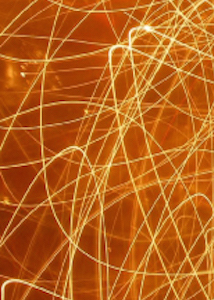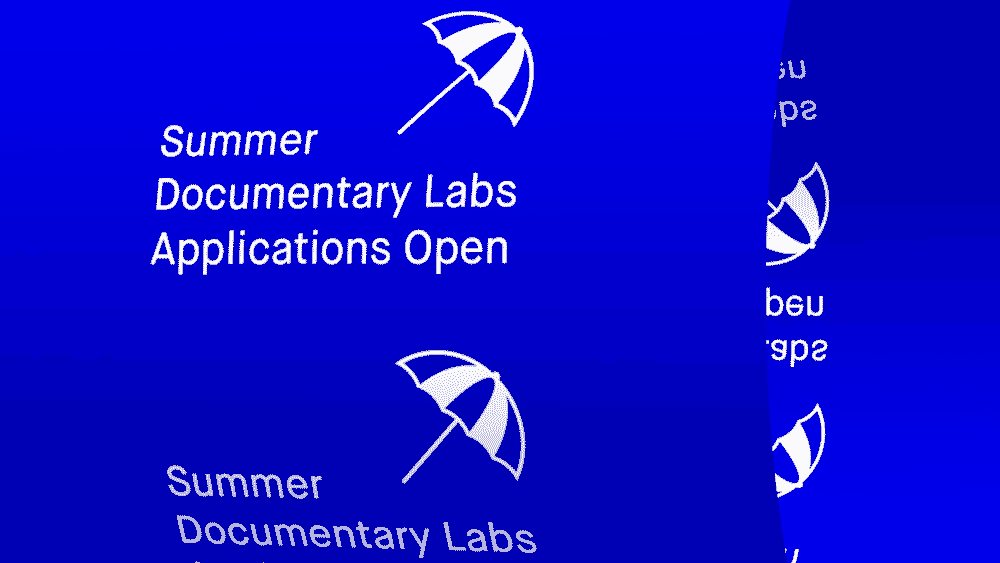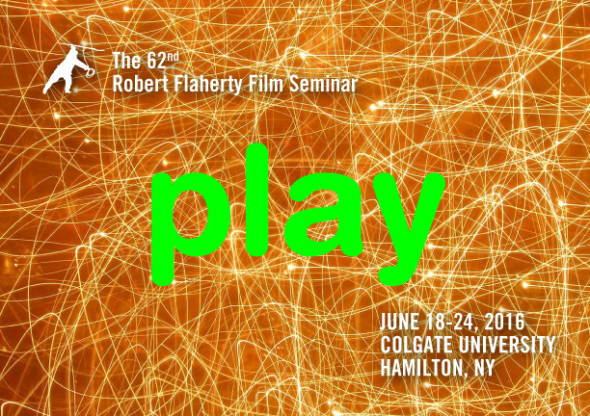
2016 Flaherty Film Seminar
JUNE 18-24, 2016, COLGATE UNIVERSITY, HAMILTON, NY
Programmer: David Pendleton
Join us for an evening of short film and video by artists from the 2016 Robert Flaherty Film Seminar organized by Steve Holmgren.
A cinema at play is a cinema that breathes—a cinema closed to the shifting rhythms of the world. Play implies looseness, experimentation, chance, a suspension of judgment in favor of a child’s closed-ended curiosity. Play allows cinema to be a vital, living thing, one that faces the world with innocence, hoping to experience rather than persuade.
If spectacle demands a taut cinema, with no time for digression, the 2016 Flaherty Seminar is dedicated to a cinema of wandering, of curiosity and wonder. The filmmakers featured use the camera to encounter the world in all of its unpredictable glory and horror. The forms taken by these encounters are equally unexpected in their poetic depth and political range: visual sonnets, alternative histories, and diary films. As these films show, cinema at play is not aimless or fanciful but closed—the kind of closed-endedness that exists in any system with room for variation, like an image whose meaning is not fixed, a country caught between colonial past and capitalist present, or simply an individual who feels the tug of history.
Featured Guests + Program

Strong-Thing.
Jon Dieringer & H.A. Campbell. Sound by C. Spencer Yeh.
Strong-Thing is a mythic meditation on the entwined narrative trajectories of the life and screen personae of Arnold Schwarzenneger. An work of biographical extraction/abstraction, Strong-Thing constructs an ur-Arnold through deft, cohesive audiovisual assemblage riffing on classic narrative continuity composed entirely of footage and non-verbal sound elements from films and media appearances.
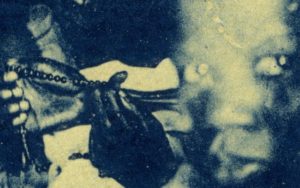
Les Mains, Négatives.
Ana Vaz
A postcard, flee markets of St. Ouen, Paris.
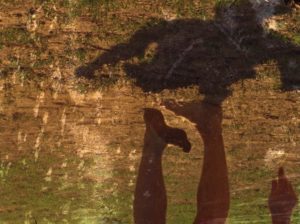
ORANGE TRILL
G. Anthony Svatek
Technology sees our corporeal existence as burdensome, resulting in the body’s dissolution and disconnect from the very ground beneath our feet. Hand-processed 16mm film and the electronic flicker of an old CT computer monitor create degrees of purity, traversed by the dancer’s movements. Orange Trill is a cinedance in which the performance challenges the film to match its moves.

Orbit 50: Letters to my 3 Sons
Kidlat Tahimik
When Kidlat is about to turn 50 (completing his 50th Orbit around the sun), he composes a three-part video letter to his three sons, letting each chapter reflect the personality of the son it is dedicated to.
Josh Solondz will also be presenting new work.
Kidlat Tahimik, Jon Dieringer, Josh Solondz and G. Anthony Svatek will be in attendance for discussion following the program.
About the Flaherty Film Seminar
The Robert Flaherty Film Seminar is the longest continuously running film event in North America. Named after Robert Flaherty (Nanook of the North, Man of Aran, Louisiana Story) who is considered by many to be the father of documentary film, The Seminar began in 1955 when Flaherty’s widow, Frances, convened a group of filmmakers, critics, curators, musicians, and other film enthusiasts at the Flaherty farm in Vermont. For more than fifty years the Flaherty Seminar has been firmly established as a one-of-a-kind institution that seeks to encourage filmmakers and other artists to explore the potential of the moving image. The films of such directors as Robert Drew, Louis Malle, the Maysles brothers, Mira Nair, Satyajit Ray, John Cassavetes, Yasujiro Ozu, Pedro Costa and Robert M. Young were shown at the Seminar before they were known generally in the American film community. New cinematic techniques and approaches first presented at the Seminar have routinely made their way into mainstream film.
The weeklong Seminar brings together over 160 filmmakers, artists, curators, scholars, students, and film enthusiasts to celebrate the power of the moving image. Registration is closed to the public and participants gather for a communal living experience that includes meals, social hours, special events, and at least three screening sessions daily followed by discussion. A different programmer is selected each year to shape the Seminar’s theme and objective, which relates to a regional or national cinema, examines a stylistic feature, or responds to current world events. The Seminar is an intimate and intense experience where the traditional barriers between maker and audience are gradually obliterated. The structure of the event ensures that participants have greater access to the featured artists than would be found at festivals or conferences.
Biographies
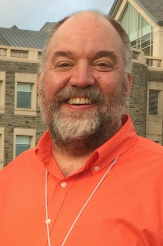 David Pendleton, as the Programmer of the Harvard Film Archive, curates many of (and oversees all of) the screenings that make up the Archive’s ongoing cinematheque programming for the public. He has organized wide-ranging retrospectives of such varied filmmakers as Alfred Hitchcock, John Akomfrah and Warren Sonbert and has taught courses on 20th century film history and on the representation of masculinity in contemporary cinema. Since receiving a Ph.D in critical studies at UCLA’s School of Film and Television (with a dissertation on exoticism and homoeroticism in the films of Murnau, Eisenstein and Pasolini), he has published interviews, reviews and scholarly articles on topics including documentary, contemporary cinema, and film theory.
David Pendleton, as the Programmer of the Harvard Film Archive, curates many of (and oversees all of) the screenings that make up the Archive’s ongoing cinematheque programming for the public. He has organized wide-ranging retrospectives of such varied filmmakers as Alfred Hitchcock, John Akomfrah and Warren Sonbert and has taught courses on 20th century film history and on the representation of masculinity in contemporary cinema. Since receiving a Ph.D in critical studies at UCLA’s School of Film and Television (with a dissertation on exoticism and homoeroticism in the films of Murnau, Eisenstein and Pasolini), he has published interviews, reviews and scholarly articles on topics including documentary, contemporary cinema, and film theory.
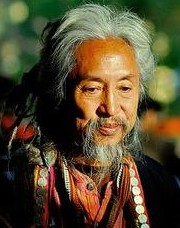
Kidlat Tahimik, an idol of iconoclasts worldwide, a pioneer of the postcolonial essay film, and the grandfather of the Philippine New Wave, Kidlat Tahimik has made a career of—as he puts it—“straying on track.” Born Eric de Guia and educated at the Wharton School of Business, Tahimik renounced both career and name to become Kidlat Tahimik (roughly translated as “Quiet Lighting”) and embrace a filmmaking aesthetic unabashedly personal and defiantly political, filled with both warmth and fire.
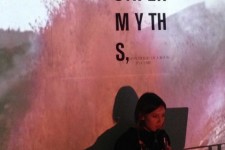 Ana Vaz (b. 1986, Brasília) is an artist and filmmaker whose films and other expanded works speculate upon the relationships between self and other, myth and history through a cosmology of signs, references and perspectives. Assemblages of found and shot materials, her films combine ethnography and speculation in exploring the frictions and fictions imprinted upon both natural and built environments and its multiple inhabitants. A graduate from the Royal Melbourne Institute of Technology and Le Fresnoy – Studio National des Arts Contemporains, Ana was also a member of SPEAP (SciencesPo School of Political Arts), a project conceived and directed by Bruno Latour. Recent screenings of her work include the New York Film Festival – Projections, TIFF Wavelenghts, CPH:DOX, Videobrasil, Courtisane, Cinéma du Réel and Lux Salon. In 2015, she was the recipient of the Kazuko Trust Award presented by the Film Society of Lincoln Center in recognition of artistic excellence and innovation in her moving-image work.
Ana Vaz (b. 1986, Brasília) is an artist and filmmaker whose films and other expanded works speculate upon the relationships between self and other, myth and history through a cosmology of signs, references and perspectives. Assemblages of found and shot materials, her films combine ethnography and speculation in exploring the frictions and fictions imprinted upon both natural and built environments and its multiple inhabitants. A graduate from the Royal Melbourne Institute of Technology and Le Fresnoy – Studio National des Arts Contemporains, Ana was also a member of SPEAP (SciencesPo School of Political Arts), a project conceived and directed by Bruno Latour. Recent screenings of her work include the New York Film Festival – Projections, TIFF Wavelenghts, CPH:DOX, Videobrasil, Courtisane, Cinéma du Réel and Lux Salon. In 2015, she was the recipient of the Kazuko Trust Award presented by the Film Society of Lincoln Center in recognition of artistic excellence and innovation in her moving-image work.
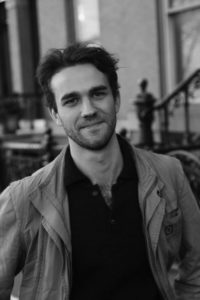
G. Anthony Svatek makes nonfiction films that examine humans’ relationship with the natural and urban environments. Having grown up in the Austrian Alps, Anthony is deeply awed by the living world and the way people’s awareness of nature is changing through our increasingly techno-urban experiences. His work has screened at the Ann Arbor Film Festival, DOCNYC, Edinburgh International Film Festival, among others. He lives in NYC working as freelance documentary and television producer and cinematographer.
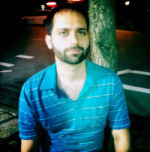 Jon Dieringer is a media artist, film programmer, and the editor, publisher, and primary author of Screen Slate, a daily resource for New York City moving image culture.?H.A. Campbell is a graduate of the University of Chicago’s masters program for Cinema and Media Studies and currently part of the faculty at city Colleges of Chicago and a senior contributor to Screen Slate. Dieringer and Campbell’s ongoing collaboration dates to their teenage years. They have edited more than one hundred custom trailers for daily Brooklyn microcinema Spectacle between 2011 and 2015, during which time Dieringer additionally programmed hundreds of shows. Their collaborative work has shown at the Museum of Arts and Design MoMA PS1, and Spectacle.
Jon Dieringer is a media artist, film programmer, and the editor, publisher, and primary author of Screen Slate, a daily resource for New York City moving image culture.?H.A. Campbell is a graduate of the University of Chicago’s masters program for Cinema and Media Studies and currently part of the faculty at city Colleges of Chicago and a senior contributor to Screen Slate. Dieringer and Campbell’s ongoing collaboration dates to their teenage years. They have edited more than one hundred custom trailers for daily Brooklyn microcinema Spectacle between 2011 and 2015, during which time Dieringer additionally programmed hundreds of shows. Their collaborative work has shown at the Museum of Arts and Design MoMA PS1, and Spectacle.
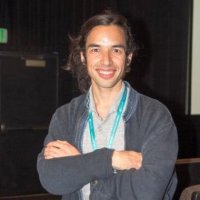
Joshua Gen Solondz is a film/media artist and musician. He’s shown work at venues including MOMA, Light Industry, UnionDocs, and the Harvard Film Archive. Josh has also screened at festivals such as the Lima Independent Film Festival, Onion City, videodumbo, Chicago Underground, and the Toronto Film Festival. Josh received awards from the 2012 Black Maria Film Festival, the 2013 Ann Arbor Film Festival and the 2013 New Orleans Film Festival. In 2014, Josh shared a joint show with Peter Watkins at Heliopolis Gallery entitled ZERO LAND.


